The Play's a Thing
We always remember “where we were” when tragic news is delivered. When the two bombs were detonated at the Boston Marathon on Monday, April 15th, I was at a play.
I was at Shakespeare’s Love’s Labor’s Lost, a show I co-directed with my close friend and frequent collaborator, James Kennedy. It was produced at Emerson College by the Emerson Shakespeare Society, a student organization. The show is something James and I had been working on for over a year. As a final semester senior, I saw it as my swan song, a love sonnet to my school.
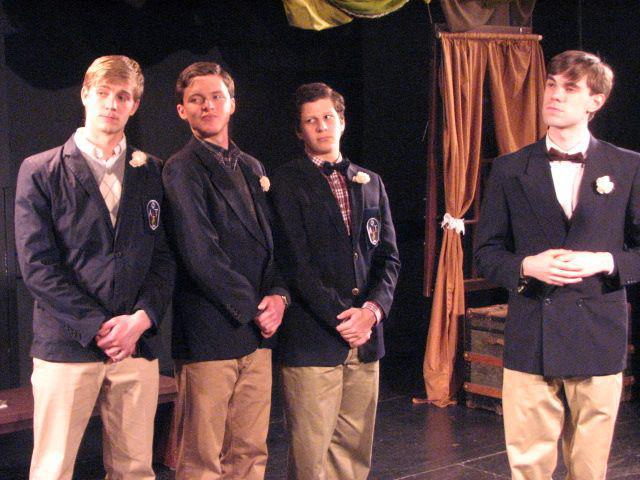
We placed the production at Emerson College in the 1950s, in the brownstones of Boston’s Back Bay neighborhood, along the Charles River (where Emerson’s campus used to be located before it moved to the Boston Common). A springtime play about four nitwit boys who make a wintery vow to foreswear women, sleep, and food to study to become true academics. They did this because their understanding of love was that of fame, which would be gained through academe. They foreswear the true love of one for the illusory love of all. Of course, as soon as they make this vow, the Princess of France and her train of three arrive. Each boy breaks his unnatural oath and falls in love. At first, secretly, and then together.
We made the four boys members of a prominent, proud, blazer-and-patch wearing, professional fraternity on campus, Phi Alpha Tau (a fraternity I’m a member of). We interpreted characters as professors, prats, campus security officers, and class clowns.
We set it at Emerson because the hunt for fame is something very real here. At a school dedicated to the communicative arts—specifically film, theater, television, marketing, writing—many students are like the four boys: desperate for the breed of love that is fame. Like the boys, students take oaths to involve themselves in countless curricular and extracurricular projects in order to gain experience and maturity (myself most certainly included). But, as learned in Love’s Labor’s, the only true maturing process is when time and life smacks us coldly with loss in the most unpredictable moments. It’s through the processes of love and suffering that we grow.
The play gave us a chance to be with each other. It gave us a chance to process, cope, relate, and begin to understand in our own ways. And for that, I will be forever grateful. And forever in awe of the beauty and community theater can make.
In the final scene of the play, the clown ensemble (similar to the Mechanicals of Midsummer) is performing a ridiculous “play within the play,” a pageant of The Nine Worthies. In the height of the antics, mocking, and merriment, a messenger, Mercade, in all black, enters the stage. The crowd dies down.
MERCADE: God save you, madam!
PRINCESS: Welcome, Mercade;
But that thou interrupt’st our merriment.
MERCADE: I am sorry madam; for the news I bring
Is heavy in my tongue. The king your father—
PRINCESS: Dead, for my life!
The scene gets cold. The clowns are shooed away. The Princess must leave and return to France with her maids. The boys beg for them to stay, the ladies won’t. In a moment of quick-thinking and mature logic, the Princess orders the boys to spend a year quiet and contemplative, alone. If they still love the ladies after a full year, they can come “challenge” them for love. The play ends with only two of the clowns getting married—all the rest peel away, going their separate ways to deal with loss, suffering, and love. The boys are forced to take a true vow, one not of fame, but of love to another person. Shakespeare doesn’t tell us if they keep the vow or not. I believe because it’s more a vow for the audience.
On Monday, April 15th, we opened with a matinee. And after, perhaps the most hilarious (and iconic) scene of the play: when the four boys discover they are all in love and together agree to woo and win the women of France, without waiting a beat, a staff person from the theater walked on stage,
“Ladies and gentlemen, we have just been informed that ten minutes ago, two bombs went off at the Boston Marathon in Copley Square.”
Audience members looked to me, as if it was part of the show. A professor in the audience cried out, “Everyone call your family.” In shocked silence, we all hastily exited the theater. Actors in costume and all.
Being Resident Assistants for the College, James and I ran to our dorm building to assist in locking down the campus. The cast was told to find shelter somewhere close. We cancelled the performances for the rest of the day.
Copley Square is only a few blocks away from Emerson’s campus. The theater we performed in was on the same street as the bombings, Boylston. Seven Emerson students were injured in the blasts. Our entire community was shocked, hurt, and violated.
The president of our college cancelled school the next day. How could college activities go on? The school was still staggering, at a loss for what to say, what to do, or how to respond.
On Tuesday, I woke up early in the morning, charged. We had the day off. Everyone was on campus with nothing to do. And we had a play.
I texted my co-director, collaborators, and producers. We called Student Affairs (which operates the student theater), and asked if it could be opened and operated. They agreed and thanked us. We added a 2pm matinee and we continued with our originally planned 7:30pm performance. The Shakespeare Society made both performances free. The manager of the theater came in to run lights and sound himself. James called the cast just a few hours before the show, asking if they were willing to come in and do it, for whoever showed up. Some cast members were initially reluctant to perform so soon after the disaster, but all eventually agreed.
Once the cast arrived, we sat in the theater. Being a particularly close ensemble, we assembled into a giant hug, discussing how lucky we all felt that we were together when we got the news—to have known immediately that we were all physically unharmed. And then we were thankful. We were thankful for the play. Because God knows if we didn’t have the play, we’d be home watching the news confused, frustrated, and angry. Instead of crying, we could laugh—we had a play we could perform. One we were all proud of. And we could offer it to anyone who wanted it.
The doors opened, the house filled up with students, parents, and faculty, and once lights went down, the audience began cheering and clapping.
That day, we were able to provide a Shakespearean comedy full of antics and fun set at Emerson, a love letter to Boston for Emersonians, for Bostonians. And then, when the messenger came on in the final scene, we all understood. Our collective breath was taken away. It was ironic, cosmic, cathartic, and, indeed, spiritual. We had a time to connect, reflect, process, and begin sharing in the healing process. Together. Actors, audience, all.
This production taught me the ways that theater can provide service and ministry in times of a city-shaking disaster. In the aftermath of tragedy, we had a comedy. A play that could distract and provide entertainment as well as perspective. A play that could bring people together in a room and provide a form of immediate triage to our community.
And I don’t begin to suggest that the play is the “be-all end-all.” It is, indeed, only a play. It can’t connect us or help us understand the pain and trauma those at the Finish Line felt. Or the pain of the families who lost someone that day. The play didn’t catch the suspects. And the play most certainly didn’t make everything better. No. The following days were hard, and they continue to be hard.
But it did bring people together. For two packed performances—24 hours after the tragedy, when the answers were few—young people (all of whom, it turns out, were about the same age as one of the suspects) took a break from the television, from the computers, from the texts and came together to watch a Shakespearean comedy. And to think of this comedy in the Aristotelian sense, as a social corrective, seems right. Our production became a civic event. This play taught us that even though Boston, and indeed Boylston St. (our street), is now famous for this tragedy, it’s not about that. Moving forward, it’s about love.
The play gave us a chance to be with each other. It gave us a chance to process, cope, relate, and begin to understand in our own ways. And for that, I will be forever grateful. And forever in awe of the beauty and community theater can make.
But, as the Princess notes in her final monologue of the play, the immediate aftermath of tragedy is “A time, methinks, too short to make a world-without-end bargain in.” To a degree, it feels premature to analyze the circumstances so soon after the event. Like the characters (who we made the same age as ourselves), we have moved from innocence to experience. Only time will tell how we will look back on this moment.

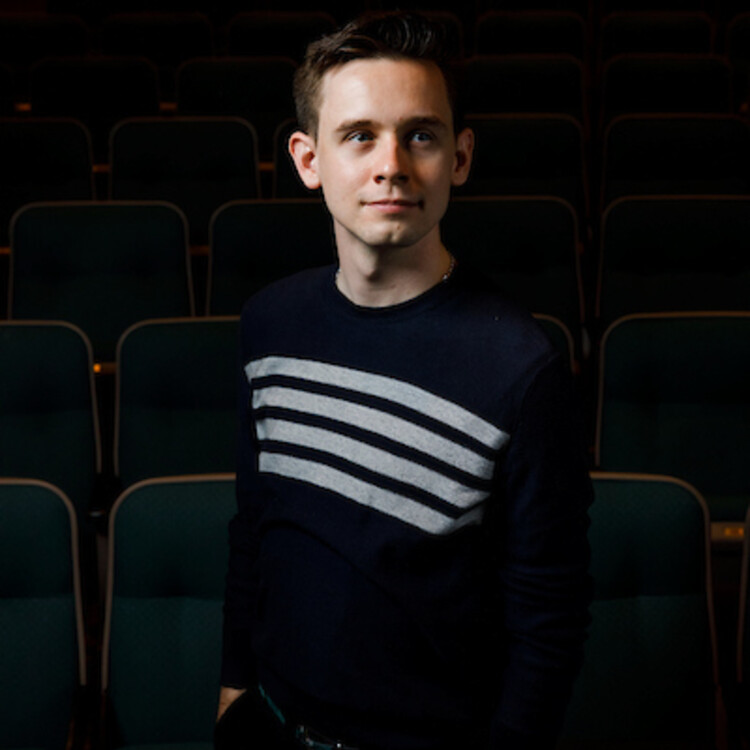
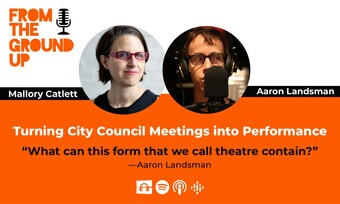



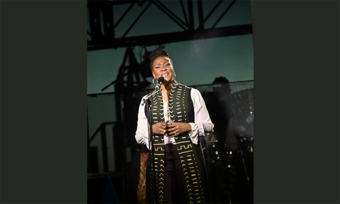

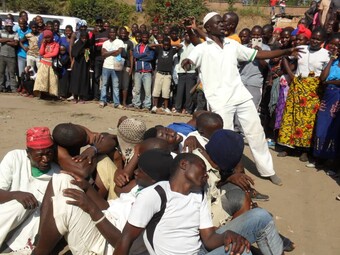

Comments
The article is just the start of the conversation—we want to know what you think about this subject, too! HowlRound is a space for knowledge-sharing, and we welcome spirited, thoughtful, and on-topic dialogue. Find our full comments policy here
Alex, wonderfully written and stated. You are right that watching the constant replaying of the horror on television was no way to spend a lost day. You and your troupe provided an excellent outlet for emotion, release and escape from the events that will forever be part of your perspective on the world. Aunt PC
Thank you Alex. I enjoyed your article. I lived in Cambridge for 3 years in the early eighties while my first husband attended Harvard Law School. Also we lived half between Harvard and MIT. I loved my time there and still have a very soft place in my heart the whole greater Boston area. I'm glad you all found a way to cope with the tragedy of the bombings that occured so close to you, as well as aid others in doing the same. By the way, I am Ian's aunt. Good luck to you all.
This is a thoughtful and beautiful commentary, underscoring the importance of love and laughter in the darkest of moments. As a mother of one of your actors, I am relieved to now understand the comfort my daughter and her fellow thespians offered each other, when many were so far away from family and home. A work that was important to you all before that day, takes on new proportions of greatness, as it solidified a new family and helped to replace terror with laughter and love. It sure can matter how you take a fall, and who is there to catch you. Thank you for loving each other.